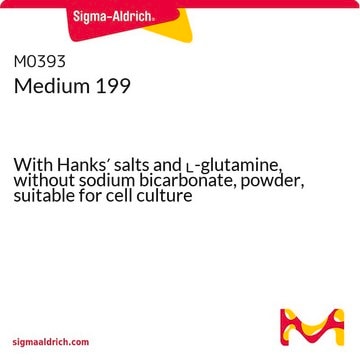56312C
Medium 199 Modified
with Earle′s Balanced Salts, with 0.68 mM L-glutamine, without sodium bicarbonate, dry powder, suitable for cell culture
Pharma Manufacturing
Synonym(s):
Medium 199
About This Item
Recommended Products
description
for research or for further manufacturing use
Quality Level
form
dry powder
technique(s)
cell culture | mammalian: suitable
components
L-glutamine: 100 mg/L
NaHCO3: no
Earle’s salts (5% CO2): yes
phenol red: 21.42 mg/L
shipped in
ambient
storage temp.
2-8°C
Looking for similar products? Visit Product Comparison Guide
Related Categories
General description
Components
Quantity
Storage Class Code
10 - Combustible liquids
WGK
WGK 3
Flash Point(F)
Not applicable
Flash Point(C)
Not applicable
Personal Protective Equipment
Certificates of Analysis (COA)
Search for Certificates of Analysis (COA) by entering the products Lot/Batch Number. Lot and Batch Numbers can be found on a product’s label following the words ‘Lot’ or ‘Batch’.
Already Own This Product?
Find documentation for the products that you have recently purchased in the Document Library.
Customers Also Viewed
Our team of scientists has experience in all areas of research including Life Science, Material Science, Chemical Synthesis, Chromatography, Analytical and many others.
Contact Technical Service



